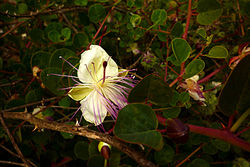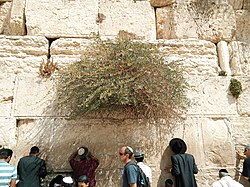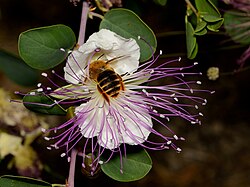Biology:Capparis zoharyi
| Capparis zoharyi | |
|---|---|

| |
| On Sierra Minera de Cartagena-La Unión | |
| Scientific classification | |
| Kingdom: | Plantae |
| Clade: | Tracheophytes |
| Clade: | Angiosperms |
| Clade: | Eudicots |
| Clade: | Rosids |
| Order: | Brassicales |
| Family: | Capparaceae |
| Genus: | Capparis |
| Species: | C. zoharyi
|
| Binomial name | |
| Capparis zoharyi Inocencio et al.
| |
| Synonyms | |
| |
Capparis zoharyi is a perennial, deciduous species of caper.
Description
It differs from Capparis spinosa mainly because of its upright habit, reaching up to two meters in height. In spring it resprouts from the branches, not from the stock as does C. spinosa, so it ends up developing a trunk that can become quite thick.
Its leaves are rounded and scotate and its fruit is elongated with yellow pulp. It is often hybridized with C. spinosa.[1]
It is a winter deciduous species. The first shoots appear in mid-March. It appears in bloom during the summer (mainly in June), and the first fruits appear in July. At the end of September it loses its leaves.
Habitat and distribution
This species grows on slopes, embankments, building walls and roadsides.
It is distributed occasionally in some areas of Spain, Morocco, Algeria, the Middle East, Turkey and the island of Crete.
In Spain the species is exclusive of the mountains of Cartagena, especially in the mining area of Cartagena-La Union, where it develops in the environment of abandoned mining facilities. It can also be found in the surroundings of the port of the city itself.[2][3]
Conservation status
In Spain it is listed as endangered according to the Red List of endangered vascular flora (2008). Globally the species is not evaluated (NE).
From the legal point of view, in Spain the species does not have any type of protection, although some of its populations are included within the regional park of Calblanque, Monte de las Cenizas and Peña del Águila, or are in the surroundings of protected mining buildings, such as the entire mining area, with the category of Bien de Interés Cultural (BIC).
Taxonomy
Capparis zoharyi was described by Inocencio, D. Rivera, Obón & Alcaraz and published in Annals of the Missouri Botanical Garden 93: 145. 2006.[4]
See also
References
- ↑ "TAPENERA DE LA SIERRA MINERA. Capparis zoharyi [Capparaceae - Región de Murcia Digital"] (in es). https://www.regmurcia.com/servlet/s.Sl?sit=a,0,c,365,m,1308&r=ReP-23888-DETALLE_REPORTAJES.
- ↑ Inocencio, Cristina; Rivera, Diego; Obón, Ma. Concepción; Alcaraz, Francisco; Barreña, Jose-Antonio (2006). "A systematic revision of Capparis section Capparis (Capparaceae)". Ann. Missouri Bot. Gard. 93 (1): 122-149. http://webs.um.es/drivera/miwiki/lib/exe/fetch.php?id=investigacion&cache=cache&media=mobt-93-1-122.pdf.
- ↑ Apuntes sobre biología, ecología y distribución de Capparis zoharyi en la Región de Murcia (in Spanish).
- ↑ "Capparis zoharyi" (in es). http://www.tropicos.org/Name/100305348.
Wikidata ☰ Q15545432 entry
 |




